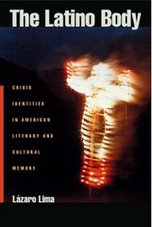 Lázaro Lima
Lázaro LimaSleep Dealer is set on the U.S.-Mexico border where high-tech factories allow the protagonist, Memo, and other migrant workers, to plug their bodies into a network to provide virtual labor for the North. Sleep Dealer constitutes one of the first instances of “Latino Sci-Fi” film and genre making and this is significant. Why? Because there is no tradition of science fiction writing to speak of in Latino literary and cultural studies. There are no Octavia Butlers or Samuel Delanys, as in the African American tradition, no Laurence Yeps or S. P. Somtows, as in the Asian American tradition, to engage in a sustained critique of the ideology of genre as it pertains to a future subject position yet to be imagined; an ideation of Latino futurity that has not yet achieved an ideology of form in the present. What are we to discern from the absence of science fiction writing in Latino literary and cultural studies? What are we to make of this and how should we read this absence?
As I’ve noted in The Latino Body and elsewhere, from “the American 1848” to the present, Latino literary and cultural interventions have been surprisingly consistent in making their relationship to the state historical. From one the earliest “Mexican American” novelist like Maria Amparo Ruiz de Burton writing in the XIX century to the extreme contemporary of Latino memoir, literary production has sought to create a logic of presence in the past, anticipating one of the fundamental conundrums raised by Fred Jameson’s recent work; namely, how to own the "inevitable failures" of the past without making defeatism the foregone conclusion of their inheritance. Understood from the confines of a "Latinocentric" perspective, Jameson’s observation might be rendered in the form of a question: By haunting the cultural sphere of the past, do we depoliticize the possibility for a viable Latino future? Or, even better, Why have we allowed the very futures of Latinidad to be colonized through an insistence on the narrative renderings of our stories, our lives, our Latinidades, in the preterite and imperfect tense of the historical imagination? Exile, diaspora, loss, memory, trauma, history, U.S. military campaigns in our countries, language barriers and borders, all emblematic of the Latino experience in the U.S. and carved into niche marketing strategies for publishers, only tell, retell, and package part of historical desire. What those stories can’t imagine is the possibility of making our relationship to the state anything other than historical. In the process, I believe we run the risk as cultural agents in the academy of allowing majortitarian political actors to colonize the very futures of Latinidad.
One of the fundamental questions of Latino studies, then, should be: How do we decolonize the future? If following Jameson, “History is what hurts,” then how might, say, Latinos in space redress that hurt by imbricating our “ethno-racial” particularisms in a future imagined from our present as owners of that future before it is wrested from us like our seemingly unwritten past? I believe that such a decolonizing move, both in the theoretical gesture of investigating why this is so as well as the creation of futurity projects, might have us instantiate the emancipatory potential of a Latino studies project for our moment. A paradigm shift within our inherited race and ethnic studies models would require a recognition that what is at stake is not the location of the known but, rather, how the location of the knower dictates what counts as a legitimate object of study. Ethnic studies, after all, exists because other disciplinary formations aren’t doing their job. Yet the move requires that our students learn to ask more than how they can identify as social and political beings in a racist culture, but how the unequal distribution of social and material resources is in part managed through understanding the ethnic subject as a fractured subject who must answer the inevitable “Who am I?” before being allowed — if at all — to state the declarative “I will be.” And we, all of us in the academy, are imbricated in this impasse. Being able to move away from just such navel gazing makes it more difficult to substitute culture for the state, thereby preventing us from confusing culture with the politics of the state. As when Memo's father in the movie asks, "Is our future a thing of the past?," Sleep Dealer, along with the histories it haunts, admonishes us not to sleepwalk through history lest we be tempted to dream somebody else's dream.

